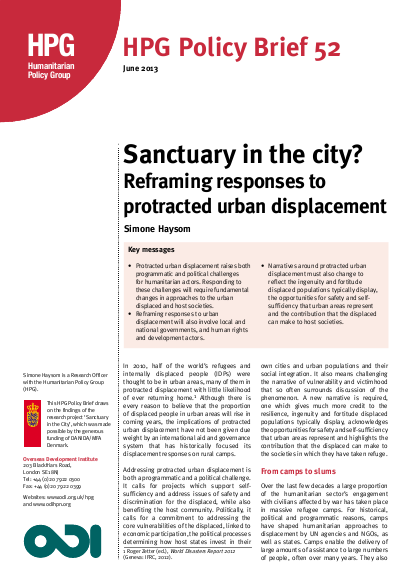HPG Policy brief

In 2010, half of the world’s refugees and internally displaced people (IDPs) were thought to be in urban areas, many of them in protracted displacement with little likelihood of ever returning home. Yet the implications of protracted urban displacement have not been given due weight by an international aid and governance system that has historically focused its displacement responses on rural camps.
This policy brief draws on findings from the three year DANIDA-funded Sanctuary in the City project to argue protracted urban displacement requires fundamental changes in approaches to the urban displaced and host societies. It outlines both the programmatic and political challenges that are raised for humanitarian agencies and argues that reframing responses to urban displacement will also involve local and national governments, and human rights and development actors. Narratives around protracted urban displacement must also change to reflect the ingenuity and fortitude displaced populations typically display, the opportunities for safety and self-sufficiency that urban areas represent and the contribution that the displaced can make to host societies.
Links
Resource collections
- UN Habitat - Urban Response Collection
- Urban Response - Urban Crisis Preparedness and Risk Reduction
- Urban Response Collection - Community Engagement and Social Cohesion
- Urban Response Collection - Economic Recovery
- Urban Response Collection - Environment and Climate Change
- Urban Response Collection - Housing, Land and Property
- Urban Response Collection - Urban Crisis Response, Recovery and Reconstruction
- Urban Response Collection - Urban Resilience